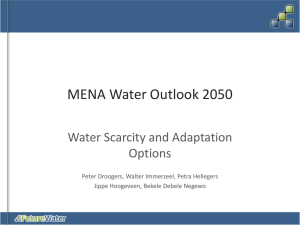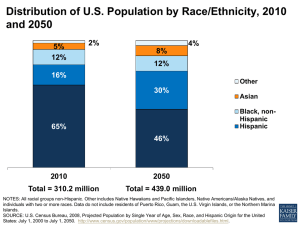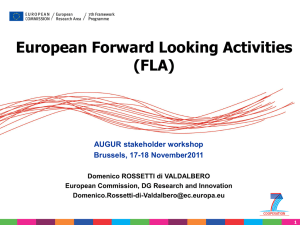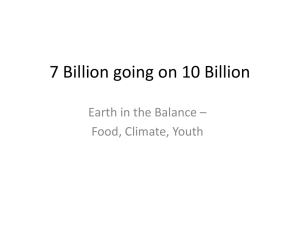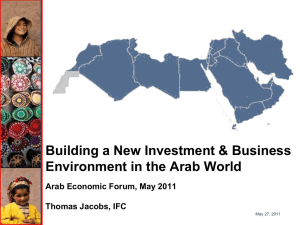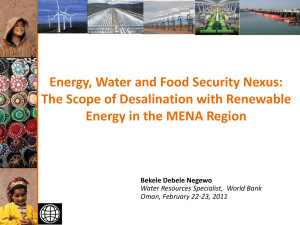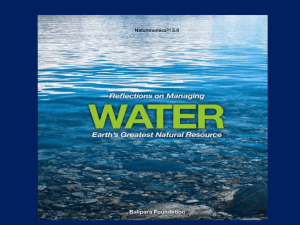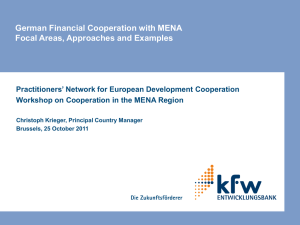MENA Water Outlook 2050 - Water Scarcity and Adaptation Options
advertisement
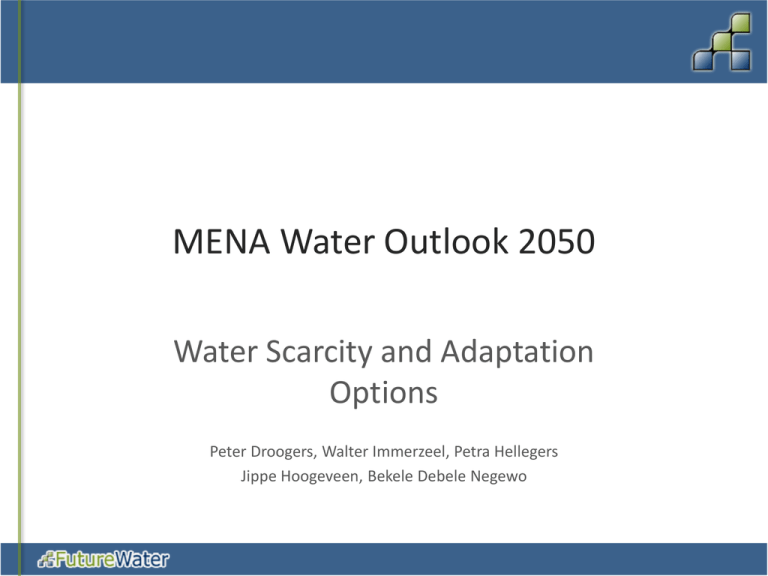
MENA Water Outlook 2050 Water Scarcity and Adaptation Options Peter Droogers, Walter Immerzeel, Petra Hellegers Jippe Hoogeveen, Bekele Debele Negewo Study Design • Objectives – Detailed water supply and demand analysis 2010-2050 – Identification of potential options to overcome water shortage • Steps – – – – Climate and other change projections Hydrological impact model Water resources supply/demand analysis Cost and benefits adaptation options • Limitations – Large scale so simplifications, generalizations WEAP Modeling Framework • WEAP modeling setup – – – – – – 22 countries Streams, Reservoirs, Groundwater Irrigation, Domestic, Industry 2000-2050 3 climate change models Results from hydrological model Catchment Reservoir Irrigation Urban Industry Groundwater Outlet RESULTS: DEMANDS Results 2000 2010 2020 Demand curves MENA (AVG) 2030 2040 2050 Results Demand curves MENA (DRY) 2000 2010 2020 2030 2040 2050 2030 2040 2050 Demand curves MENA (WET) 2000 2010 2020 Results Demand and Supply Curves MENA (AVG) Results Demand and Supply Curves MENA (DRY) Demand and Supply Curves MENA (WET) Iran Morocco Yemen Egypt Water Demand-Shortage (MCM) Algeria Bahrain Djibouti Egypt Gaza Strip Iran Iraq Israel Jordan Kuwait Lebanon Libya Malta Morocco Oman Qatar Saudi Arabia Syria Tunisia U.A. Emirates West Bank Yemen MENA Demand 2000-2009 6,356 226 28 55,837 162 79,703 43,968 3,140 1,113 508 1,202 4,125 88 15,739 891 489 21,733 16,183 2,772 3,370 403 5,819 263,853 Demand 2020-2030 8,786 321 46 70,408 299 92,310 57,130 4,619 1,528 867 1,525 4,974 122 19,357 1,544 602 26,667 19,446 3,985 3,495 652 8,162 326,842 Demand 2040-2050 12,336 391 84 87,681 527 110,081 71,113 6,081 2,276 1,216 1,869 5,982 148 24,223 2,807 641 35,257 24,418 5,916 3,389 1,061 19,065 416,562 Unmet 2000-2009 0 195 0 2,858 140 11,325 7,272 2,118 853 0 141 0 34 2,092 0 234 10,572 873 0 3,036 256 1,262 43,265 Unmet 2020-2030 8 304 0 22,267 283 29,721 26,907 3,733 1,338 310 471 1,399 80 9,175 663 418 18,146 4,539 17 3,203 555 3,540 127,078 Unmet 2040-2050 3,925 377 0 32,085 505 51,753 43,096 5,130 2,061 788 876 3,625 107 15,381 2,194 481 28,535 9,498 2,853 3,173 957 14,289 221,691 MCM/year; average climate change ADAPTATION STRATEGIES Water Marginal Cost Curves • Closing supply-demand gap: – Increasing the productivity – Expanding supply – Reducing demand • Water marginal costs curves • Assumptions: – Net present value (US$ 2010) Strategies • Increasing the productivity: – A: Improved agricultural practice (including crop varieties) – B: Increased reuse of water from domestic and industry – C: Increased reuse of irrigated agriculture • Expanding supply: – – – – D: Expanding reservoir capacity (small scale) E: Expanding reservoir capacity (large scale) F: Desalination by means of using solar energy G: Desalination by means of reverse osmosis • Reducing demand: – H: Reduce irrigated areas – I: Reduce domestic and industrial supply Strategies (increase productivity) • A: Improved agricultural practice (including crop varieties) – Typical examples: • • • • • • • drip and sprinkler irrigation no-till farming improved drainage utilization of the best available germplasm or other seed development optimizing fertilizer use innovative crop protection technologies extension services – Costs • US$ 0.01 per m3 • = US$ 100 per ha per year – Note: costs can vary substantially. E.g.: • Egypts Irrigation Improvement Project (IIP) US$ 100 per ha per year • 2030 Water Resources Group US$ 0.02 – 0.03 per m3 Strategies (increase productivity) • B: Increased reuse of water from domestic and industry – Costs • US$ 0.30 per m3 – Note: costs can vary substantially. • What to do with reused water (industry, irrigation) Strategies (increase productivity) • C: Increased reuse of irrigated agriculture – Assumptions • • • • Reuse only for agriculture No water treatment system Only operational and investment costs 50 mm per year – Costs • Total: US$ 0.04 per m3 • 50% annualized capital costs of investment • 50% operational costs (maintenance, some pumping) Strategies (expanding supply) • D: Expanding reservoir capacity (small scale) • E: Expanding reservoir capacity (large scale) – Costs •0.03 $/m3 for small scale •0.05 $/ m3 for large scale – Note: costs can vary substantially •sand dams in Kitui District, Kenya 0.04 $/m3 •Aslantis Dam, Turkey 0.035 $/m3 Strategies (expanding supply) • F: Desalinisation using solar energy (CSP) • G: Desalination using reverse osmosis – Assumptions • Details see presentation by Fichtner – Costs • CSP 0.70 $/m3 to 0.35 $/m3 in 2030 and 2050 • Reverse osmosis 0.50 $/m3 – Note: costs can vary substantially • Especially energy Reverse Osmoses Multi Effect Distillation SWRO = Sea Water Reverse Osmoses MSF = Multi Stage Flash MED = Multi Effect Distillation Strategies (reducing demand) • H: Reduce irrigated areas – Assumptions • Reduce irrigated areas by 10% – Costs • 0.10 $/m3 (Value of irrigation water (Water Productivity) between 0.05 and 0.15 $/m3. – Note: costs can vary substantially. E.g.: • Crops • Irrigation method • Climate Virtual Water Trade RESULTS Water Supply and Demand MENA region KM3 PER YEAR DEMAND AVG CC Scenario DRY WET 2000-2009 2040-2050 2040-2050 2040-2050 264 417 435 398 Irrigation Domestic Industry 213 28 23 265 88 64 283 88 64 246 88 64 UNMET DEMAND 43 222 306 104 Irrigation Domestic Industry 36 4 3 144 45 34 204 58 44 61 22 21 221 189 130 283 171 50 150 39 99 31 228 55 SUPPLY Surface water Groundwater MENA: Water Marginal Costs Curves All values in 2010 US$ net present value Egypt Saudi Arabia Adaptation Costs (2050, average climate) Algeria Algeria Algeria Bahrain Bahrain Bahrain Djibouti Djibouti Djibouti Egypt Egypt Egypt Gaza Gaza Gaza Strip Strip Strip Iran Iran Iran Iraq Iraq Iraq Israel Israel Israel Jordan Jordan Jordan Kuwait Kuwait Kuwait Lebanon Lebanon Lebanon Libya Libya Libya Malta Malta Malta Morocco Morocco Morocco Oman Oman Oman Qatar Qatar Qatar Saudi Saudi Saudi Arabia Arabia Arabia Syria Syria Syria Tunisia Tunisia Tunisia U.A. U.A. U.A. Emirates Emirates Emirates West West West Bank Bank Bank Yemen Yemen Yemen MENA MENA MENA Shortage Shortage Shortage Costs Costs Costs MCM MCM MCM million million million US$ US$ US$ 3,925 3,925 3,925 353535 377 377 377 130 130 130 00 0 00 0 32,085 32,085 32,085 4,000 4,000 4,000 505 505 505 200 200 200 51,753 51,753 51,753 6,000 6,000 6,000 43,096 43,096 43,096 12,000 12,000 12,000 5,130 5,130 5,130 1,800 1,800 1,800 2,061 2,061 2,061 750 750 750 788 788 788 250 250 250 876 876 876 200 200 200 3,625 3,625 3,625 700 700 700 107 107 107 353535 15,381 15,381 15,381 4,000 4,000 4,000 2,194 2,194 2,194 700 700 700 481 481 481 150 150 150 28,535 28,535 28,535 9,000 9,000 9,000 9,498 9,498 9,498 1,250 1,250 1,250 2,853 2,853 2,853 200 200 200 3,173 3,173 3,173 1,100 1,100 1,100 957 957 957 325 325 325 14,289 14,289 14,289 4,200 4,200 4,200 221,691 221,691 221,691 47,025 47,025 47,025 Costs Costs Costs Costs Costs Costs Costs Costs Costs Costs Costs Costs %GDP 2050 US$/m3 US$/m3 US$/m3 US$/capita US$/capita US$/capita %GDP %GDP %GDP 2010 2010 2010 %GDP %GDP 2050 2050 0.00 0.01 0.01 0.01 11 1 0.02 0.02 0.02 0.00 0.00 0.11 0.34 0.34 0.34 969696 1.15 1.15 1.15 0.11 0.11 0.00 0.00 0.00 0.00 00 0 0.00 0.00 0.00 0.00 0.00 0.33 0.12 0.12 0.12 272727 3.27 3.27 3.27 0.33 0.33 0.40 0.40 0.40 108 108 108 0.18 0.12 0.12 0.12 565656 1.76 1.76 1.76 0.18 0.18 0.87 0.28 0.28 0.28 196 196 196 8.71 8.71 8.71 0.87 0.87 0.12 0.35 0.35 0.35 171 171 171 1.21 1.21 1.21 0.12 0.12 0.66 0.36 0.36 0.36 717171 6.59 6.59 6.59 0.66 0.66 0.05 0.32 0.32 0.32 474747 0.48 0.48 0.48 0.05 0.05 0.25 0.23 0.23 0.23 393939 2.49 2.49 2.49 0.25 0.25 0.08 0.19 0.19 0.19 646464 0.80 0.80 0.80 0.08 0.08 0.47 0.33 0.33 0.33 777777 0.99 0.99 0.99 0.47 0.47 0.54 0.26 0.26 0.26 727272 5.47 5.47 5.47 0.54 0.54 0.23 0.32 0.32 0.32 969696 2.35 2.35 2.35 0.23 0.23 0.07 0.31 0.31 0.31 161 161 161 0.72 0.72 0.72 0.07 0.07 0.30 0.32 0.32 0.32 154 154 154 3.04 3.04 3.04 0.30 0.30 0.36 0.13 0.13 0.13 353535 3.59 3.59 3.59 0.36 0.36 0.02 0.07 0.07 0.07 131313 0.21 0.21 0.21 0.02 0.02 0.31 0.35 0.35 0.35 253 253 253 3.16 3.16 3.16 0.31 0.31 0.03 0.34 0.34 0.34 104 104 104 0.27 0.27 0.27 0.03 0.03 3.16 0.29 0.29 0.29 454545 31.82 31.82 31.82 3.16 3.16 0.21 0.21 0.21 67 67 67 2.58 2.58 2.58 0.26 0.26 0.26 Conclusions • Study – – – – – Advanced hydrological-water resources approach In country variability Monthly approach Changes: climate, GDP, domestic, industry, agriculture Scoping study • Overall results – – – – – Renewable water resources 20% reduction Water shoratge 220 km3 (range 104-306) Water shortage due to climate change 14% (range 1-35) Costs of adaptation US$ 47 billion (range 12-98) Costs of adaptation 2050: 2.5% to 0.3% of GDP (current to 2050 GDP) • Adaptation is possible, if policies are put in place now! Comparison Other Studies • “Economics of adaptation to climate change” (World Bank, 2010): – Developing countries: 0.2 percent GDP (2030) – Developing countries: 0.12 percent GDP (2050) – MENA: US$ 2.5 – 3.6 billion per year (2050) • “2030 Water Resources Group” – MENA: increase in demand: 99 km3 (2030) • Making the Most of Scarcity (World Bank, 2007): – MENA: 1 – 3.6% of GDP (currently) • AQAU-CSP (DLR) – Water shortage: 50 km3 (current) – Water shortage: 150 km3 (2050) 2050: Shortage (km3): 220 (104-306) Costs (billion US$): 47 (12-98) GDP (%): 0.3 – 2.5 Way Forward • Water shortage: – Unconventional decisions needed – Food, environment, tourism, industry? – Subsidies on water-food-energy • Water-energy nexus • Long and short term decisions • Detailed case studies (country, topic) THANK YOU GDP projections Morocco Egypt
